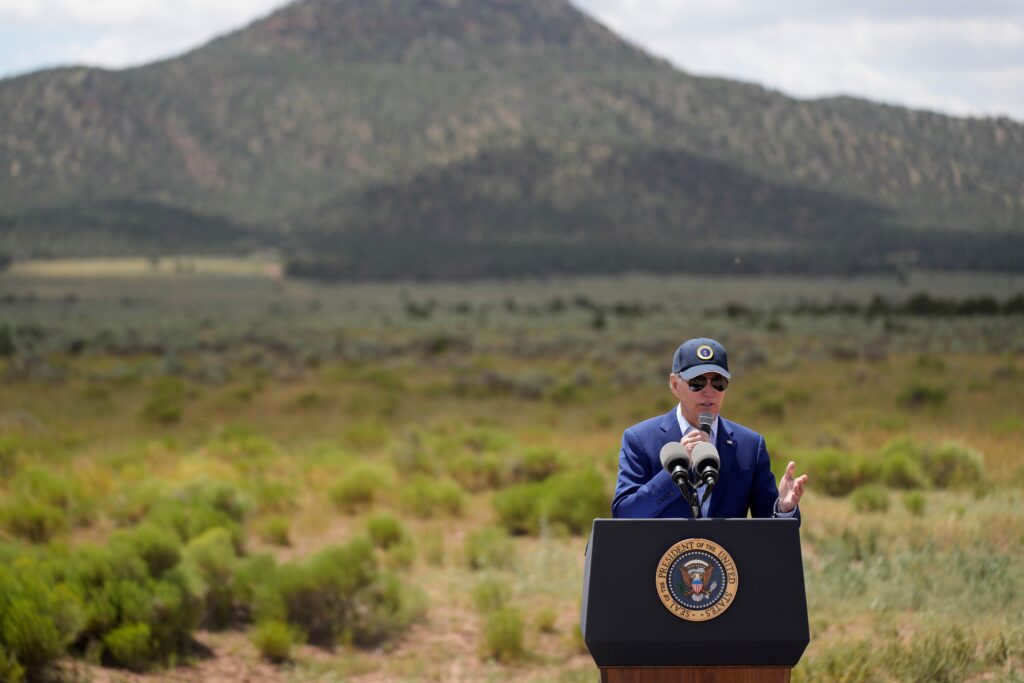- President Biden is a lifelong public servant, and he’s behind in polls for reasons he can’t change.
- So, for the sake of the country, Biden has a critical decision to make:
- Whether or not to step aside so the Democrats can nominate another candidate.
President Joe Biden has dedicated almost his entire professional life to serving our country.
This summer, he will have another critical opportunity to do that.
Specifically, he will have to make a decision that, in my opinion, could determine the future of American democracy.
That decision is this:
Whether to accept his party's nomination to run for a second term… or step aside and let the Democrats nominate another candidate.
Whether or not you believe that "democracy is on the ballot" this fall (or care), you will probably agree that the stakes in this election are unusually high. So, at their convention this summer, the Democrats will want to nominate the strongest possible candidate.
Based on recent polls, it does not seem that Biden is necessarily the strongest possible candidate.
And even once he finishes sweeping the primaries, Biden does not necessarily have to be the candidate.
Because, as political experts explain, Biden could still step aside before the Democratic convention this August and allow the Democrats to nominate someone else.
So, over the next six months, for the sake of his country — or at the very least the Democratic party and its policy objectives — Biden needs to dispassionately assess whether he is, in fact, the strongest possible candidate. If not, he should step aside.
So, over the next six months, for the sake of his country, Biden needs to dispassionately assess whether he is, in fact, the strongest possible candidate. If not, he should step aside.
In making this decision, Biden needs to look and think carefully about not what is "true" or "right" or about what he wants most Americans to think, but what Americans actually think.
According to recent polls, even in our polarized country, most Americans actually agree about several things.
One is that ex-President Trump would do a better job than Biden on the economy (mostly, it seems, because of still-high inflation). Another is that Trump would do better on immigration, another highly visible issue. A third is that most Americans (a remarkable 81% of us) think that Biden is too old to run for president. (Most of us think Trump is too old, too, but fewer of us.)
In a diverse country, 81% is a startling and resounding consensus.
What’s more, 76% of us have either "major" or "moderate" concerns about Biden’s mental and physical fitness for a second term.
Now, maybe all of that is just unfairness or perception. Maybe Americans who think those things are just being stupid or falling for oppositional propaganda or are just being worrywarts.
But here’s the thing:
When it comes to elections, perception is reality.
And, for most voters, our current perception is that Trump is the less bad and less old of two weak candidates that most Americans have deep misgivings about.
If, despite Biden’s age, Americans agreed he was doing a bang-up job as president or were thumping Trump in the polls, we could dismiss these concerns.
But only 37% of us approve of the job Biden is doing.
And Biden is now trailing ex-Pres. Trump in the swing-state polls and losing to him in the betting markets.
True — the election is nine months away.
True — a lot might change before then, including the polls.
But the way things stand today, it looks to many like Biden’s decision to accept the Democratic nomination might affect the future of America’s democracy — and, with it, the Constitution and country that Biden has sworn to protect.
Of course, a key factor in deciding whether to step aside is whether there is anyone else the Democrats could nominate who could be a stronger candidate.
Polls suggest, for example, that it would be stupid for Biden to step aside so the Democrats can nominate Vice President Kamala Harris because she would do even worse against Trump.
But most potential Democratic candidates deferred to Biden's desire to enter the primaries and didn't enter the race, so I don't think we really know yet whether there is a stronger candidate. By nominating someone at the convention, moreover, Democrats can choose the candidate they think has the best chance to win the general election, as opposed to the one that appeals most to Democratic voters in the primaries.
As New York Times columnist Ross Douthat has explained, it would be better if Biden waited until mid-summer to make (or at least announce) his decision:
The next six months would provide time to see whether the polls change meaningfully — a key factor in the analysis. The waiting period would also give the broader Democratic party time to figure out whether anyone else might make a stronger candidate. And it would allow more of Trump's legal trials to play out.
If, by early August, the analysis suggests that Biden is, in fact, the strongest candidate, then the best way to serve his country would be to accept the nomination. If, on the other hand, Biden concludes that someone else might have a better chance, he could serve his country better by dropping out.
